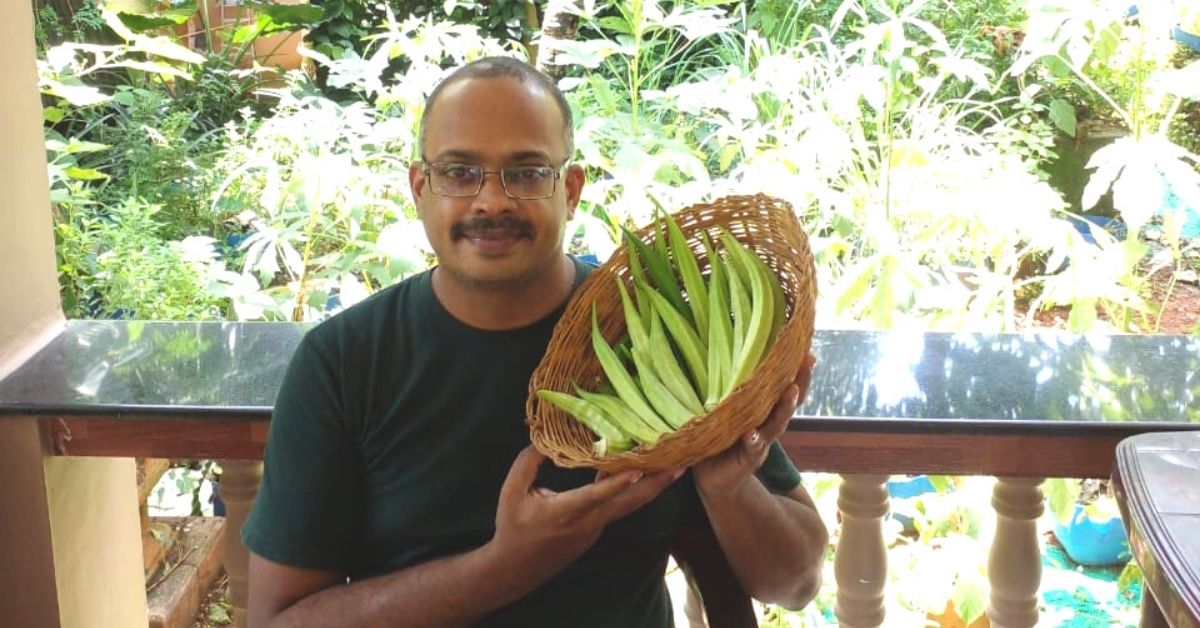How to Grow Organic Okra in Recycled Pots: Karnataka Professor Shares Easy Steps
Hari Prakash, an urban gardener from Karnataka's Udupi, has been growing enough organic okra at home to serve the daily needs of his four-member family for the last 11 years

Hari Prakash is a faculty of the MBA department of the Srinivas Institute of Technology, Mangalore. In his free time, the 46-year-old tends to his urban garden in Udupi, and grows plants including brinjal, okra, spinach, and gourd, as well as fruit varieties such as pineapple, lemon, rose apple, fig and jackfruit on his 0.2-acre land.
Hari says that his family was always fond of growing organic vegetables, and that he has been growing them since 2010. When he realised that soil on his land was hard, he decided to attempt to grow okra and other vegetables in pots and containers.
He tells The Better India that he decided to grow them in a pot to create the right mix to grow the plants. Today, Hari has organically grown 20 okra plants in recycled containers, which serve the needs of his four-member family.
Hari shares his mantra of growing okra in pots.
‘Directly sow seeds in the container’

Hari says that he sourced discarded containers of 20-litre capacity, which are used in industries, from a friend. “The pot or containers should be big enough to hold the plant. The potting mixture should have a mix of soil, sand, and compost in equal proportions,” he adds.
He advises not to cover the entire pot with the mixture, and instead fill only one-third of its total capacity. “The soil mixture should be added gradually every 15-20 days as the plant grows,” he explains.
Hari cautions that, unlike other plants, okra cannot be replanted by creating a sapling and shifting it to a big pot. “Okra does not grow healthy or yield fruits if it is replanted. Hence, it is better to sow the seeds directly in the pot,” he says.
For adding nutrition during the growth period, the urban gardener suggests adding diluted slurry from vermicompost. This forms during the composting process. The occasional addition of organic fertiliser can also serve the purpose.
‘One plant yields 1.5 kilos’
Video: How to grow okra in plants.

To control pests, Hari suggests creating a mixture of 5 ml neem oil and vinegar each, with one teaspoon of baking soda, a litre of water, and an organic detergent to spray on the plants every fortnight. “The mixture should be sprayed irrespective of pest infestations, as it also acts as a preventive measure,” he adds.
Hari says the plant should be watered once a day on sunny days and that the frequency should be reduced during the rainy season. “The watering depends on the sun’s intensity, as excess water may affect the growth of the plant,” he adds.
It takes about 1.5 to two months for the plant to bear okra from sowing, depending on the weather conditions and the plant’s health. Each plant yields about 1.5-2 kilos of okra. “The 20 okra plants are adequate to provide us enough yield every ten days,” Hari says.
The life of the okra plant is about 6-7 months, after which the seed needs to be sowed again.
On a parting note, Hari has a message for inspiring urban gardeners. “You can easily grow poison-free vegetables in your home, even if it is a small place, and make it a hobby. It is a great stress buster,” he says.
Hari suggests starting with vegetables that are easier to grow, such as brinjal, long beans, tomatoes and chilli. “Practice, observe, read and learn to grow organic vegetables. Do not overspend on buying many things related to vegetable gardening. Grow in recycled or waste containers and prepare your compost fertiliser,” he says.
Hari also has a YouTube channel where he shares gardening tips. Check out the link here.
Edited by Divya Sethu
If you found our stories insightful, informative, or even just enjoyable, we invite you to consider making a voluntary payment to support the work we do at The Better India. Your contribution helps us continue producing quality content that educates, inspires, and drives positive change.
Choose one of the payment options below for your contribution-
By paying for the stories you value, you directly contribute to sustaining our efforts focused on making a difference in the world. Together, let’s ensure that impactful stories continue to be told and shared, enriching lives and communities alike.
Thank you for your support. Here are some frequently asked questions you might find helpful to know why you are contributing?


This story made me
- 97
- 121
- 89
- 167











